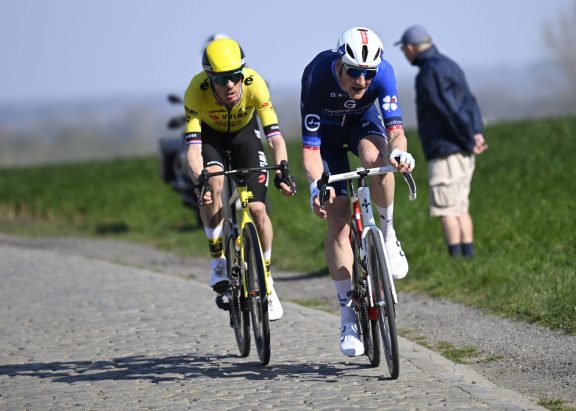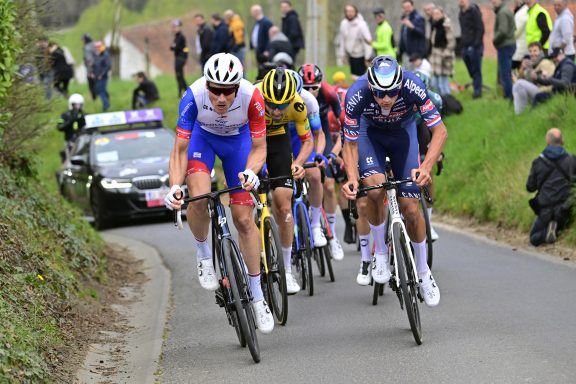A few days before the Tour of Flanders, Valentin Madouas and Stefan Küng once again showed their great form on Wednesday on Dwars door Vlaanderen. They were part of a select group of favorites for about fifty kilometres, but they did not get rewarded for their efforts. After missing Christophe Laporte’s move in the last kilometres, they were also caught at the last moment by a small peloton and therefore had to settle for positions outside the top-20. A very frustrating outcome, but a promising performance before the second Monument of the year.
The Flemish campaign’s next stop was planned on Wednesday in Waregem, for a WorldTour with an aptly name: Dwars door Vlaanderen. The 183-kilometre course including eleven climbs and almost as many cobblestone sectors (ten, editor’s note) made for a final rehearsal before Sunday’s event. The competition was also more homogenous as the three favourites for the Ronde weren’t there, which promised an open race. Others saw it as an opportunity to bring the breakaway very far, in particular Yevgeniy Gidich (Astana Qazaqstan), Oier Lazkano (Movistar), Nickolas Zukowsky (Q36.5), Ward Vanhoof (Team Flanders-Baloise), Leon Heinschke (Team DSM) and Alexander Kristoff (Uno-X), who took the front early on and enjoyed a four-minute lead at best. Their gap was however reduced by half when approaching the first series of climbs, about a hundred kilometres from the finish. “Trek-Segafredo opened up the race from the first time in the côte de Trieu,” explained Stefan Küng. “From then on, it was full gas until the finish, with a lot of attacks. “We knew we had to be very attentive in the first climbs, and that the race was going to really get harder in Berg Ten Houte”, added Frédéric Guesdon. “We were very careful, but the difference was made a little further on, on the second ascent of the Côte de Trieu”. Beforehand, Lewis Askey tried to take a step ahead but was caught before the decisive “bergs” while Kevin Geniets was first delayed by a mechanical problem then by the crash of Tim Merlier, just like Jake Stewart.
“They did not work extremely well together”, Frédéric Guesdon
After the Kanarieberg, a small bunch of fifty riders got back together, with Stefan Küng, Valentin Madouas and Olivier Le Gac for Groupama-FDJ. The rest of the competitors found themselves already eliminated sixty kilometres from the finish. After a short flat portion, the riders therefore got to the côte de Trieu, where a move really broke clear. Shortly after the summit, Valentin Madouas and Stefan Küng managed to enter group of eight, with Christophe Laporte, Tiesj Benoot (Jumbo-Visma), Mikkel Honoré, Neilson Powless (EF Education-EasyPost), Jhonatan Narvaez (Ineos Grenadiers) and Quinten Hermans (Alpecin-Deceuninck). Gradually, the group started to collaborate but did not manage to get really close to the morning break or to definitely leave the bunch behind. “It was a very serious group”, added Frédéric. “We had two men in there, so we were very happy, but we could see that the gap was not growing because everyone wanted to keep a bit of energy. They even had trouble getting back on the morning breakaway. In the back, the peloton did not give up either. They did not work extremely well together, and they couldn’t make a good enough difference to secure a result.” In the last forty kilometres, the pursuit group sailed for a long time 20-30 seconds from the fugitives. “It was hard”, said Valentin Madouas. “We chased for a very long time to try to bridge across while having the peloton right behind”. “In the final, not everyone collaborated 100%”, completed Stefan Küng.
“The result does not reflect our race”, Valentin Madouas
The Frenchman and the Swiss man from Groupama-FDJ always contributed to the chase but others proved more conservative, and they only joined the morning break with six kilometres to go while the peloton was just twenty seconds. The last climb of the course did not cause damage, so the leading men put in the last fight on the flat portion to Waregem. Valentin Madouas and Stefan Küng followed a few moves but did not manage to take Christophe Laporte’s wheel when the latter broke away just four kilometres from the finish. “We got tricked in the final”, explained Valentin. “Christophe was very smart tactically. He let us make the effort and made a counterattack at the right time”. Stefan Küng did try to follow the winner of Ghent-Wevelgem but it wasn’t successful. “I didn’t have the legs to follow Laporte in the final,” he said. The two riders of Frédéric Guesdon also tried to attack right after, but they got surprised by Neilson Powless and Oier Lazkano before being caught by the bunch. On the finish line, they were therefore unable to score a convincing result. “It was a hard race, but it’s a shame to be caught with one kilometre to go”, said Stefan, 23rd of the race just ahead of Olivier Le Gac. “We’re good physically, and that bodes well, but the result does not reflect our race”, pointed out Valentin. “We’re a bit disappointed, because when you have two of the eight strongest riders, you obviously hope to do better than what we did”.
“We deserved to get a result”, judged Frédéric. “Three teams had two guys in front: one won, the other made the podium, and we left with nothing. It’s frustrating. We would have liked to get at least a top-5 with one of the two. It would have been a fair reward, but that’s the way it is. Many strategies come into play in a bike race, and you can’t control everything. It’s always good to have riders in front, but we also want results. We race for it. It was also open today, we were at the start to win. It is therefore disappointing not to have come away with a result”. The team’s leaders nevertheless proved solid before the big even on Sunday. “It is now time to recover, and we will be ready for the Tour of Flanders,” concluded Stefan.



No comment